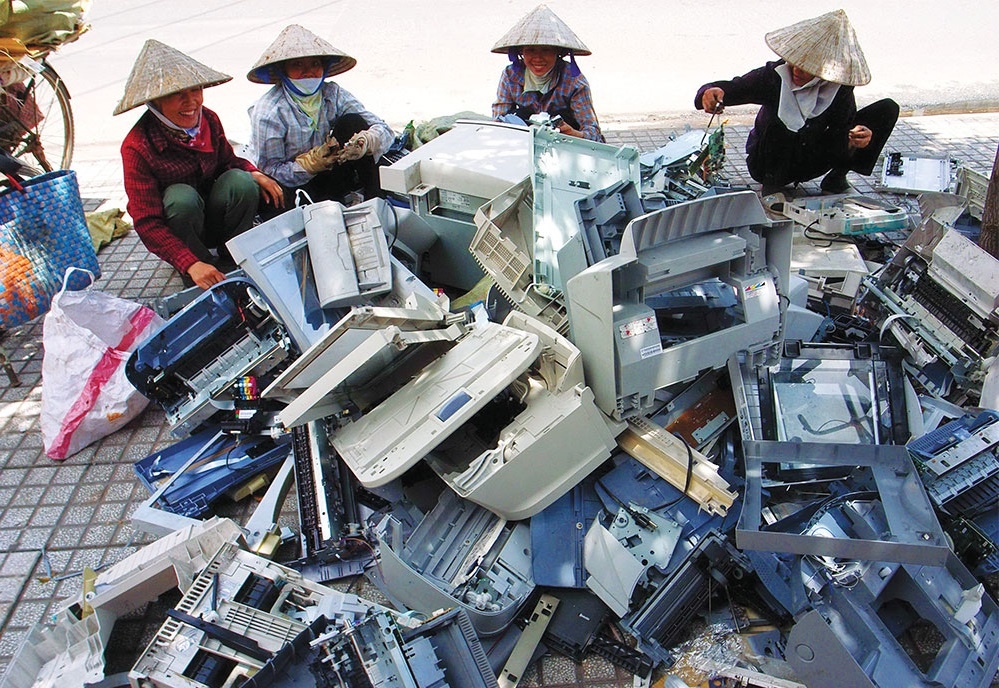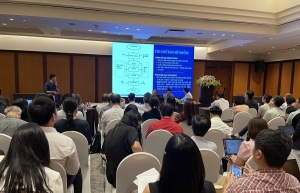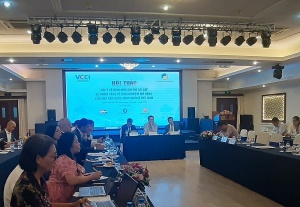Production costs at risk with draft recycling rules
 |
| The high level of recycling costs may lead to rising commodity prices and follow-on issues for businesses, Photo: Nguyen Cong Thanh |
A revised draft decision released at the end of July regarding recycling costs is expected to come online next year, but feedback to the European Chamber of Commerce in Vietnam (EuroCham) thus far indicates that additional modifications are required to support the business community adequately.
Under the draft decision, which is proposed by the Ministry of Natural Resources and Environment, recycling for a unit volume of product and packaging includes costs for sorting, collecting, transporting, and recycling products and packaging, as well as administrative expenses to support the implementation of recycling responsibilities of both manufacturers and importers.
Extended producer responsibility (EPR) regulations mandate that companies take responsibility for the end-of-life management of their products, including take-back and recycling obligations. The policy is considered crucial for Vietnam’s transition towards a circular economy model that maximises resource value and minimises waste.
The latest draft decision identifies six groups of products subject to EPR: packages, batteries and accumulators, electric and electronic devices, tyres, lubricants, and vehicles.
Among the unit level for paper packaging is 8 US cents/kg, mixed paper packaging is 10 US cents/kg, and metal packaging is 15 US cents/kg.
Although the formula is currently at 2 per cent of the overall adjusted recycling costs in the latest draft decision, this is a reduction from 3 per cent in the previous draft.
The Green Growth Sector Committee under EuroCham is advocating for admin costs below 2 per cent in the first few years, so that businesses have ample time to invest in recycling technology and facilities. After which, the fees can increase over time to cover management and monitoring efforts by the state officials, it said.
Pham Thi Ngoc, vice president of the Vietnam Dairy Association, said, “In the draft, the unit level of mixed paper packaging is calculated very high. If the level is both high and unreasonable, it will push up production costs, leading to an increase in product prices.”
She gave the example of the wholesale price of 110 ml milk cartons increasing by 0.12 per cent, saying that consumers would suffer increased prices.
Chu Thi Van Anh, general secretary of the Vietnam Beverage Association, agreed that many ideas for recycling criteria were unnecessarily high. “The unit for aluminium packaging is about five times higher than the world average, and mixed paper is 4.8 times higher,” Anh said.
Meanwhile, James Ollen, executive director of the American Chamber of Commerce in Ho Chi Minh City, said the high level of recycling costs will lead to rising commodity prices, causing difficulties for local production and business.
“Unreasonably high units, in our opinion, is due to not following the circular economy principle; that is, the value of recovered materials has not been deducted,” he said
“With materials whose recycling value is greater than the cost of recycling, such as aluminium packaging, iron, paper carton, and hard plastic packaging, if the recycler is already profitable, the unit factor should be adjusted to zero, based on Organisation for Economic Co-operation and Development recommendations,” Ollen added. “This is completely consistent with the current collection and recycling practice in Vietnam when these packages and products have basically been recovered.”
 | Businesses recoil at high recycling costs While domestic and foreign-invested enterprises welcome the calculation of reasonable and valid recycling cost for packaging, they are seeking flexible application and supporting policies to ensure sustainable development. |
 | Clearing up issues related to recycling costs Many foreign-invested producers are concerned about the high recycling costs, which could create a significant financial burden for their businesses and potentially lead to increased product prices for consumers. Being a representative for the policy marker parties, I would like to clarify some basis for building the formula to help the business community have clear knowledge on this issue. |
 | Manufacturers may pay more than $259 million per year in recycling costs Industry leaders are concerned that an all-time high and disproportionate level of recycling costs will negatively impact the ability to run a profitable business. |
What the stars mean:
★ Poor ★ ★ Promising ★★★ Good ★★★★ Very good ★★★★★ Exceptional
Related Contents
Latest News
More News
- A golden time to shine within ASEAN (February 19, 2026 | 20:22)
- Vietnam’s pivotal year for advancing sustainability (February 19, 2026 | 08:44)
- Strengthening the core role of industry and trade (February 19, 2026 | 08:35)
- Future orientations for healthcare improvements (February 19, 2026 | 08:29)
- Infrastructure orientations suitable for a new chapter (February 19, 2026 | 08:15)
- Innovation breakthroughs that can elevate the nation (February 19, 2026 | 08:08)
- ABB Robotics hosts SOMA Value Provider Conference in Vietnam (February 19, 2026 | 08:00)
- Entire financial sector steps firmly into a new spring (February 17, 2026 | 13:40)
- Digital security fundamental for better and faster decision-making (February 13, 2026 | 10:50)
- Aircraft makers urge out-the-box thinking (February 13, 2026 | 10:39)

 Tag:
Tag:

















 Mobile Version
Mobile Version